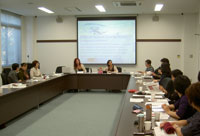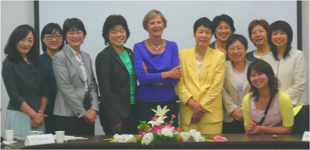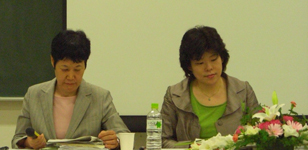イベント
- Workshop
- Date Sep. 24, 2009
- Theme”Family-Gender-Economic Policy. A New Alliance”
- Speaker Dr. Uta Meier-Grawe
- Professor for Home Economics and Family Science of Institute for Home Economics and Consumption research of the Justus Liebig University Giesen

- Summary
- There are many commonalities between Japan and Germany as seen in the “husband as a breadwinner and wife as a homemaker” model in the former West Germany. A strong desire to have a family is evident in all generations in Germany. However, there is an increase of childfree couples among younger generations. Highly educated men and women are likely to have fewer children whereas those who are economically disadvantaged are likely to have more children, thus the gap between these people is widening. Stated other way, those who have economic, social and cultural resources are less likely to have children, and those who do not possess these resources are more likely to have children.


- There is also a strong belief about the importance of maternal care giving in Germany. Despite the progress made toward gender equality, many women are found to be disappointed by the expectations that the society places on them concerning maternal care. However, a progress has been made in narrowing the wage gap between men and women in corporations. Despite this, the birth rate in Germany continues to decline.
- Children of today will be supporting older generations in the future. It is necessary to understand this in order for our society to provide assistance for families in poverty. It is also important to learn from family policies in progressive Scandinavian countries. In 2007, modeling after Sweden, Germany began providing parental support system which guaranteed a part of compensations for fathers who take child care leave. This resulted in an increase of fathers’ taking child care leave. It is essential to discuss not only ideologies but also policies and systems that can contribute to family’s well-being.

- Open Symposium
- DATE June 15, 2009
- Theme
- ”French Family Policies and the Work/Family Life Balance Issue”
Jeanne Fagnani
(Research Director at the CNRS Centre d’Economie de la Sorbonne, University of Paris 1-CNRS)
- Summary
- Since 1945, France has an explicit and institutionalised family policy that implies legal recognition of the family as a social institution playing a major role in the maintenance of social cohesion. French family policy is clearly-defined and relatively generous in terms of cash benefits. It is also linked in several ways to employment policy.

- The move away from the ‘male-breadwinner model’ already started in the seventies. Against the background of an increase in mothers’ labour force participation, the work/life balance as an issue has gained increasing salience in political life and has come to the forefront of the social policy agenda. Boundaries between state, families, and market have been progressively redrawn, evidence that the progressive entry of women into the workforce has been a driver for change in the French welfare regime.
- The progressive arrival of mothers on the labour market has therefore, through an interactive process, prompted French family policy decision makers to introduce a whole range of services for parents in paid employment, which has in turn enabled a growing number of mothers to gain access to jobs. This has gone hand in hand with changes in childrearing norms.


- Moreover France is well known for having pursued demographic objectives in its social policy, until the 1970s. However given the country’s relatively high fertility rates (2.0 compared to 1.3 in Germany by 2007), from the 1990s onwards socio-economic constraints and public concern about the dramatic rise in unemployment rates have been the main drivers for “second order” change (borrowing from P. Hall’s analysis of policy change) in reconciliation and childcare policies.
- The whole range of measures to support working parents has recently been expanded yet again. And along with the Nordic countries, France now leads the European Union in public childcare provision and benefits aimed at reducing child care costs for families. In a recent cross-national study, OECD has also shown that family spending has the greatest focus on childcare services in France and the Nordic countries.
- Among the questions which will be addressed in my presentation are: which rationales have been underpinning successive changes introduced in reconciliation policies since the seventies? What were the primary economic and social factors influencing the decisions made by successive governments in this domain over the last decade? What effects changing working conditions are having on childcare policies?

- In the first part of my presentation, I will give a brief historical overview of family policies in France. Emphasis will be put on childcare policies. The second part of my presentation will be devoted to the turning point of the seventies and to the dramatic development since the nineties of publicly subsidised and individualised childcare arrangements for pre-school children. The logics behind them will be presented. In the third part, I will describe the changes recently introduced and make some comments on their objectives, the rationales underpinning them, and their outcomes in terms of mothers’ employment patterns and fertility rates. To conclude I will comment on what is currently at stake as far as work/life balance and childcare policies are concerned and the tensions policy-makers have to deal with. The impact and outcomes of the trade-offs they have been making will be discussed.
Download Poster(pdf size:679KB) - ”French Family Policies and the Work/Family Life Balance Issue”


